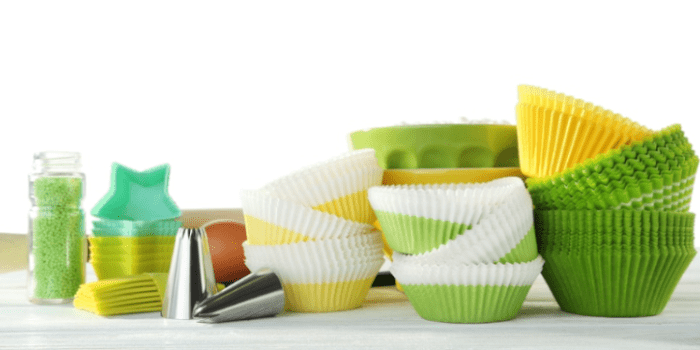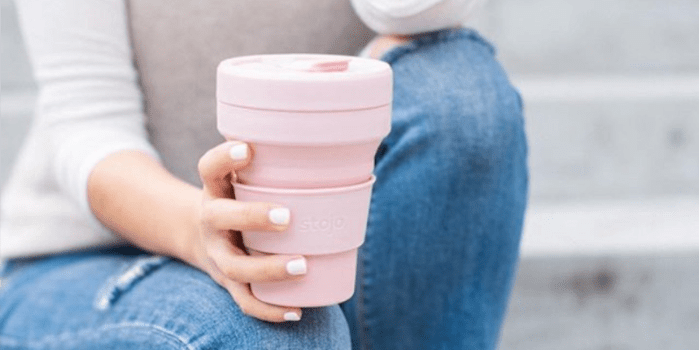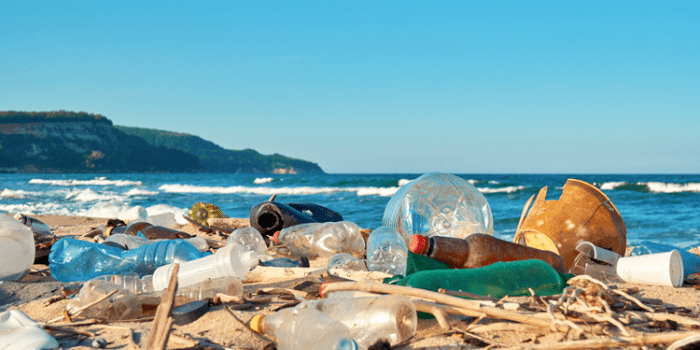Over the past 60 years, the production of plastics has increased 20-fold and we now produce more than 380 million tons of plastic each year. With so much of it around, we’re forced to put a huge portion of that plastic into landfills and unfortunately, this is just the beginning.
The most common type of plastic is PET (polyethylene terephthalate). It’s also one of the most recyclable, but many recycling centers aren’t equipped to recycle it and so this plastic often ends up in landfills.
So we can see how we have a lot of concerns about petrochemical plastics — they contribute to landfill waste and microplastics pollution. But what about silicone?
This post contains affiliate links which may earn us a small commission at no cost to you.
What, Exactly, Is Silicone?
Silicone is a non-metallic, inorganic polymer that is made up of silicon and oxygen. It has excellent thermal stability, making it the most popular material used in cookware. It conducts heat better than other types of materials.
Silicone is also flexible, durable, and does not contaminate food or flavors with plastic molecules. Unlike other non-stick coatings, food-grade silicone doesn’t react with acidic foods which creates harmful fumes while cooking on high heat.
Is Silicone Plastic?

The short answer, not at all! Plastic is made from petroleum, which is not a renewable resource. The production of plastic also uses toxic solvents and emits harmful pollutants into the air.
Silicone, on the other hand, is derived naturally from silica (which comes from sand) and oxygen. It does not contain chlorine or toxins like some forms of petroleum, and it is actually non-toxic.
There are many misconceptions about silicone being just as bad as plastic, but that is simply not true. While silicone and plastic both have practical uses, they are quite different from each other.
Is Silicone Environmentally Friendly?
A review of data on silicone shows that it is non-toxic, environmentally friendly and one of the most durable materials in the market. On top of that, it can last longer when used properly. When compared to plastics, silicone has a lower environmental impact as it is more recyclable and is not toxic.
Why Is Silicone Seen As An Alternative To Plastic?

One of the reasons why silicone is becoming an alternative to plastic is because it can be molded into different shapes. It also offers high durability, which makes it great for use in adhesives or sealants.
Silicone is also able to withstand both high and low temperatures, which means that it can go in the oven without melting.
Another thing worth mentioning with silicone is that it’s hypoallergenic, flexible, free of latex and BPA, which is why it’s becoming more and more popular over plastic.
Are There Any Downsides to Using Silicone?
Although there are many benefits of silicone, it also has its drawbacks. Some of these drawbacks include that like other plastics, pure silicone degrades over time when exposed to sunlight and air. It also doesn’t decompose in landfills; this means that instead of breaking down, it will accumulate in the dumps.
Is Silicone Biodegradable?

Any kind of silicone is not biodegradable. Some people may think that this issue would be solved if we just do regular recycling, but it can be hard for silicone to get recycled at local recycling centers.
Until more people accept silicone as a recyclable material for their recycling, there will always be a lot of it in the general waste dumping location. This means that the landfills around the world are increasing because of this substance.
Also, because there are so many kinds of silicone on the market today, we shouldn’t buy all of them and rely on them to replace every plastic product we have. Instead of doing that, we should stop and ask ourselves whether we really need to buy a new product at all (talking about consumerism…).
Silicone vs. Plastic — Final Thoughts
If you’re looking for a sustainable alternative to plastic, silicone may be the best option. Silicone is made from natural materials and can last much longer than plastics. It also won’t leach toxins into your food or drinks as some plastics do.
However, it isn’t without its drawbacks: silicon products are more expensive than their plastic counterparts and they require special care when cleaning them (you will need to use soap with no fragrance). If these downsides don’t deter you then go ahead and buy that new silicone food storage bag!
What do you think about replacing plastic items with silicone? Please share your thoughts with others by commenting below!
Additional sources: Silicon Studies, Is Silicone food-safe?, A Review on Silicone Rubber.

Iryna wants to make this world a better, greener place with less waste. Her mission is to protect the planet from plastic pollution by bringing awareness to this global crisis through her website. Send her an email to learn more about her mission and how we can help!


